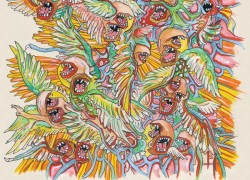
The band known as Of Montreal has existed since 1996, which makes it over 15 years old at the time of its latest release, “Paralytic Stalks.” Most bands with that kind of longevity re-invent themselves at least once to avoid growing musically stale, and Of Montreal is no different.
While many of their early albums have different storylines running through them, from the life of a relationship to a Sergeant Pepper’s-like parade, one can easily appreciate their music thanks to their accessible 60s-pop sound reminiscent of the Beatles and the Kinks.
Albums in 2004 and 2005 showed signs of a transition to a more electronic style, although the elements from their previous five albums still remained in one form or another.
While 2007 marked the release of their landmark achievement, “Hissing Fauna,” and ushered in a new era of funk-inspired music, the biggest change it brought was singer Kevin Barnes’ decision to record albums himself, as well as write lyrics from his own perspective instead of letting a cast of fantastical talking animals and fairies take center stage.
In recent years, Of Montreal’s concerts have not featured any songs from before 2004. While it could be argued that the switch would merely be too jarring, the more likely reason is that Of Montreal has become a therapeutic vehicle for Barnes.
“Paralytic Stalks” has been advertised as the band’s most personal recording yet, which is cause for either concern or excitement depending on which flavor Of Montreal prefers. Among the themes touched on in “Hissing Fauna” are Barnes’ marital strife, his problems with antidepressants and thoughts of suicide, which is about as personal as subjects can get, especially when conveyed in such a naked, first-person account.
On “Paralytic Stalks,” the track list has been trimmed down to nine songs, and no prior album has had any less than 12.
To compensate, each song now averages over six minutes in length, with one stretching out to 13 minutes long. Opener “Gelid Ascent” fittingly begins with silence before Barnes’ highly-manipulated vocals emerge and gradually become clearer as the song progresses, angrily denouncing someone as “what parasites evolved from.” Gelid, by the way, means extremely icy and cold.
This flows directly into the next song (one trick that has survived over the years is the segueing of multiple songs, as the Beatles often did) called “Spiteful Intervention,” another exceedingly bitter song which, along with titles like “We Will Commit Wolf Murder” and”Exorcismic Breeding Knife,” provide fair warning of the mood that Of Montreal aims to create on this album. However, this is by no means a death metal record.
As demonstrated on Of Montreal’s past few albums, the darkest themes are dressed up in the brightest trappings. Perhaps the best example is on “Dour Percentage,” where Barnes harmonizes with himself and is accompanied by flutes and keyboards that replicate a brass section.
On previous songs such as “Black Lion Massacre,” Barnes has made the mistake of letting the dark atmosphere choke out anylistenability it might offer. Instead, on “Paralytic Stalks,” he has remembered to employ arresting yet dense production techniques, evoking past masters like Brian Wilson or Phil Spector. On some tracks such as “Wolf Murder,” he may go a bit overboard and near cacophony, but this is always in service of the message of the song.
On “Hissing Fauna,” the mental state of the singer is not only portrayed by the heart-on-sleeve lyrics, but also in the soft or harsh nature of Barnes’ singing and the arrangement of the songs’ moving parts.
Another pitfall of which Of Montreal has been accused is recycling the same tricks over and over again. 2008’s “Skeletal Lamping” represented the peak of what Barnes wanted to accomplish sonically, with tonal shifts occurring at the most unpredictable points in the song—the effect being that if you weren’t keeping an eye on your iPod or computer there would be no telling when one song began and the other ended.
This wasn’t due to any segueing, but rather to the left-field changes in lyrics and instrumentation that would sometimes occur three-quarters of the way into a song. 2010’s “False Priest” was a disappointing follow-up because it offered nothing new and merely scaled back the ambition, with the only bright spot arriving on “Sex Karma”—a duet between Barnes and Beyonce Knowles’ sisterSolange that actually aimed for pop-crossover appeal and succeeded.
No one can accuse Of Montreal of sounding the same on “Paralytic Stalks.” The spirit of albums past can still be heard, but new styles are introduced on tracks such as “Malefic Dowery,” where an acoustic country sound and tropical getaway mood fight for control of the song as Barnes sings that he “turns to his crotch for counsel.” A line like that would be right at home on the funk sounds of “False Priest” but seems totally out of place on “Paralytic Stalks.”
The four longest songs on the album are saved for last, where progressive-rock epics like “Ye, Renew the Plaintiff” deliver the best thrills on the album. The newer incarnation of the band is the most effective when it allows room to deliver massive tales of revenge. Science fiction battles shift to gently strummed confessionals and string sections.
Of Montreal post-transformation remain a love-them-or-hate-them act, but for fans of albums like “Hissing Fauna,” an exciting new direction is promised, proving that the headphones-on, immersive, cohesive rock album is not dead yet.
